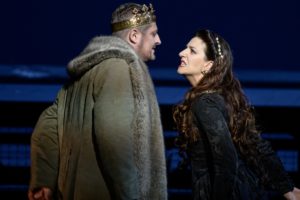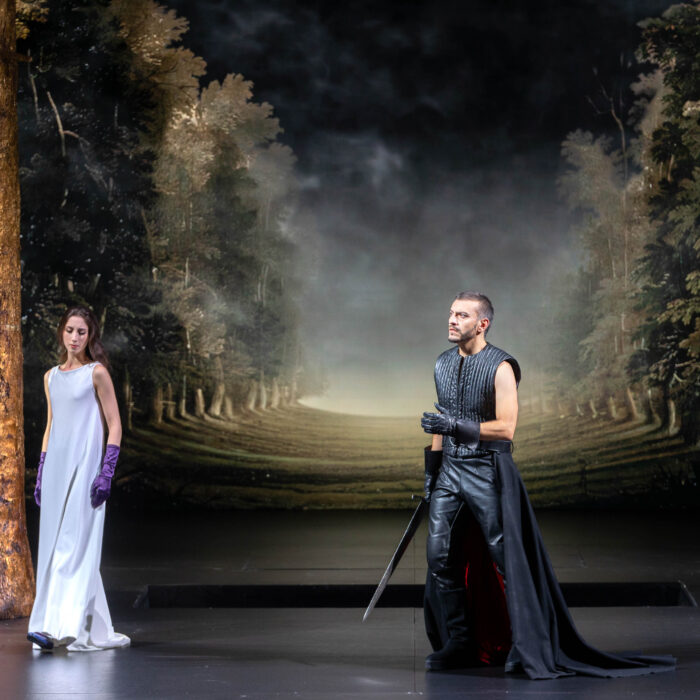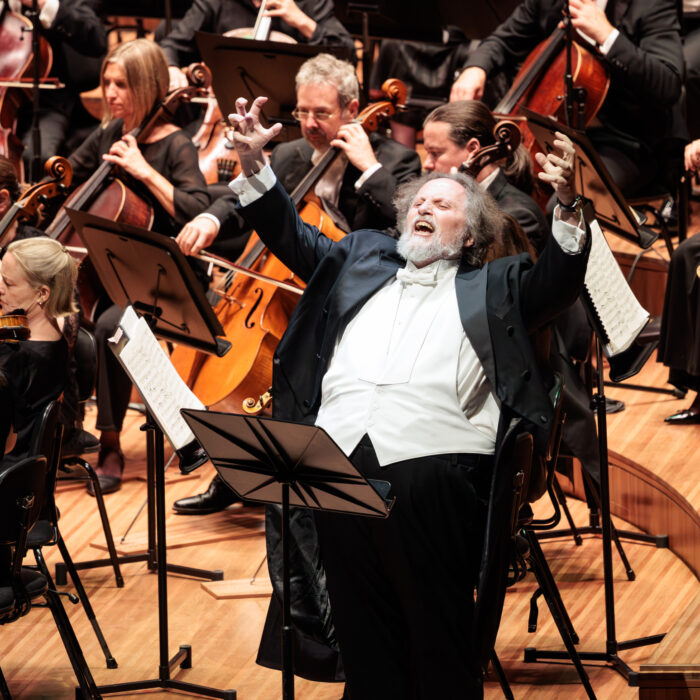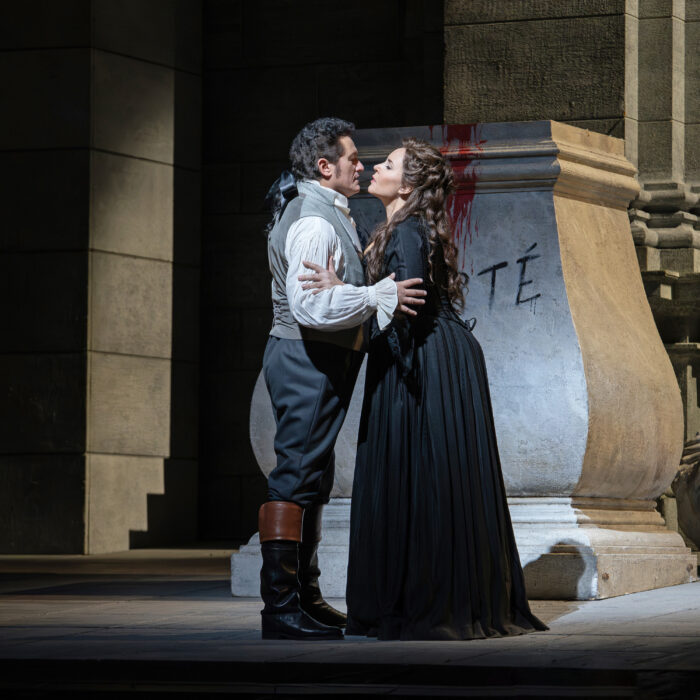
Lithuanian National Opera 2020–21 Review: Anna Bolena
Sesto Quatrini Leads Brilliant Cast Out of Pandemic and Gets LNOBT to a New Level
By Polina LyapustinaAt a press conference that took place two days prior to the opening night, Sesto Quatrini, the art-director of LNOBT and musical director of this production, stood there all alone.
One could not fault him if he had been in a cautious mood. After all, he had to contend with postponed premieres, the constant closing of the theater, and a decision to cut the orchestra in half.
But the Maestro looked excited and… victorious.
“If we make it, we will not only win over the pandemic disaster, we will show something truly exceptional.”
Premiere in the Times of COVID
The auditorium was expectedly half empty and everything seemed a little wrong. But the dim lights and soft seating instantly brought back the magical feeling of theater, which most of the people hadn’t experienced since February.
The orchestra started to warm up and the operatic usuals noticed the difference right away (I’ve never seen so many people crowded around the pit) – on this day, only a little more than 30 people would play a massive Donizetti masterpiece.
The musicians look stressed. Only God knows how long they had to rehearse to find the expected sound with just half of the musicians needed and in such a short period. But they were also curious and tried some really unexpected sounds during the warm-up. Louder, sharper, bolder, and then softer, quieter. I heard a delighted sigh from the front row. The audience was hooked.
Once they started, we knew that it would be an “Anna Bolena” we had never heard before. The first part of Sinfonia lacked musical muscularity, but after some 30 seconds, we heard how beautifully piercing the leading instruments sound in the absence of a dense background.
And then the gravity came just in time, and I no longer doubted that this orchestra would give an excellent performance.
Not a Single Weak Spot
The premiere brought not only challenges to Maestro Quatrini.
On the opening night, he could finally realize his dream about bringing a truly international cast for the opera. Italian-American tenor Michele Angelini joined soprano Francesca Sassu (in a title role) and mezzo-soprano Raffaella Lupinacci for this performance. They fit incredibly well among the cast of Lithuanian singers.
The secret of success may be that the singers for the other roles were chosen so wisely, from the very best voices of the National Opera Ensemble.
And each and every singer was so delighted to be finally on stage that night. I felt like they fully merged with their roles while waiting for the premiere since April.
It’s difficult to be distracted by such thoughts during this extraordinary performance, and yet we shouldn’t forget about how important it is for singers to be on stage. It’s not just about having a job, earning money, or singing itself.
That night, that entire brilliant cast was born again. As queens, and kings, and enamored boys. They were all there. I grew to hate the King (what a horrible blighter was portrayed by Tadas Girininkas!), although the bass sang beautifully, gradually revealing the power of his voice and reaching an incredible severity and volume in the last duet with Anna.
Jovita Vaškevičiūtė portrayed Smeton inimitably. If you ever felt like love breaks through the despair with all the power of the desiring youth — then you can imagine the singing of the Lithuanian mezzo. Though she produced impeccable, clean, and open bottom notes, her voice could easily rise to the gentle and smooth, never shrilly tops.
Paulius Prasauskas, a talented young bass with a sharp and powerful voice, performed a reliable Lord Rochefort. The irreplaceable Rafailas Karpis shone in the atypical role of Hervey, proving he can act out of the ordinary.
Two Queens-Debutantes
The title role of the Donizetti masterpiece is a tricky one. Although it is considered for the lyric soprano, it brings the voice to the dramatic field quite distinctly. And I don’t mean only the range — flexibility and binding transitions should also obtain the weigh and darkness for this role. So this night brought a lot of challenges for Italian soprano Francesca Sassu.
Her voice might not always be steady, but neither was her character. The overall performance was pure joy. Emotional and deep, she brought not only sorrow and desperation but care and strength, conscientiousness and willingness to take responsibility. That was Anna Bolena as Gaetano Donizetti saw her.
Her finest hour came in the scene with Seymour in the Second act. The raging scene and the forgiveness were vocally different but equally beautiful and performed with a precise technique. This role debut certainly opened new repertory possibilities for the Italian soprano, who mastered fluency and flexibility in low notes, without losing the brightness and tenderness of her upper range.
Raffaella Lupinacci was another role debutante as Giovanna Seymour that night. Perhaps, controversy about which voice, soprano or mezzo, is better for this role will last forever but Sesto Quatrini decided to have it all, when included Lupinacci in the cast.
Her voice, vivid and powerful, brings all the qualities of a good mezzo-soprano. When you expect it to stop rising, it keeps going and reaches very solid hight notes. But the greatest achievement of this sound production is the way she decided to use this wide range. Being romantic and submissive, you’d probably expect her to get higher, while being dejected by the guilt it seems logical to get lower. But is it so in real life? Our Giovanna, as a young woman expressed her guilt desperately and even hysterically, letting her voice rise. Her love scenes were sung in a round and versatile darker voice. That was not a literary description, but a real feeling.
The Hero of the Night
Michele Angelini, with his solid bel canto technique (a rarity among Lithuanian artists), won the audience’s hearts from the very first hight note. His passages were infallible and poured smoothly no matter what pitch difference the voice was bringing. Tenor nailed fast coloratura with confidence and ease. He wore his agility with pride, and he certainly had every reason for this. The audience burst into bravos and screams after each scene of his, and only the focus of the progress of the performance saved him from an encore.
Angelini brought incredibly clean and gentle pianissimos to his part; you can’t so easily expect those after such bright and sharp high notes being performed by a tenor throughout his scenes. He is a singer who has mastered his instrument so skillfully that any extremes seem simple and natural, giving a faithful beauty and believability to the performance.
I hope the glitter of his style and technique will inspire and teach the local singers who, for now, have not found many opportunities to get acquainted with the specifics of high-class Bel Canto.
Group work
Finally, it would be impossible not to mention the brilliant group work in every field. The best vocal moments of soloists happened in duets. Raffaella Lupinacci and Francesca Sassu developed painfully beautiful chemistry, while Tadas Girininkas in his scenes managed to show all the shades of the King’s relationships. His voice set off some partners and suppressed others.
The beautiful sextet and quartet ending of every act were the absolute pinnacles of the evening, harmonized all those various voices into a powerful single whole.
Last but not least highlight of the night was a chorus work. The ensemble was the power behind the performance. The strong, homogeneous, collective voice gave larger scope to the action and brought a sturdy background to the most dramatic scenes. And they were undeniable, accurate, and precise with both their technique and emotions.
The smaller (even National) theatres often give performances with only one star on stage. I saw many of those. But that night was the opposite. They all were stars, not just because they all shone brightly, but because they all took on the responsibility as if everything depended on each of them.
An unconditional victory
The audience exploded into thunderous applause several times during the opera. They jumped up and gave a standing ovation as soon as the curtain fell.
It certainly felt like a victory.
This is not a mindless delight, but entirely the merit of the performers, the orchestra, and of course the musical director. And even if part of this excitement is caused by the long-term absence of opera in people’s lives, this is also important. Having received such an experience, I hope that people will not forget how important this art is in their lives, and how much it gives them.
Just like maestro Quatrini should not forget this premiere.
The night when all the undreamt-of promises of changes in the LNOBT he made two years ago can be considered fulfilled. There has never been a performance of this level in the Lithuanian National Opera in recent history.
I hope there will be many more.



